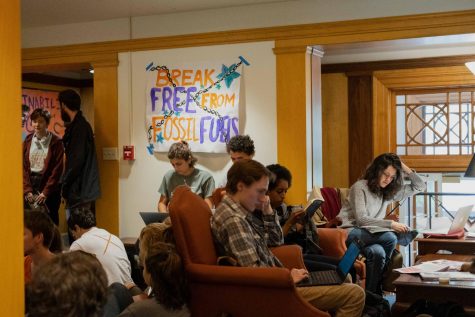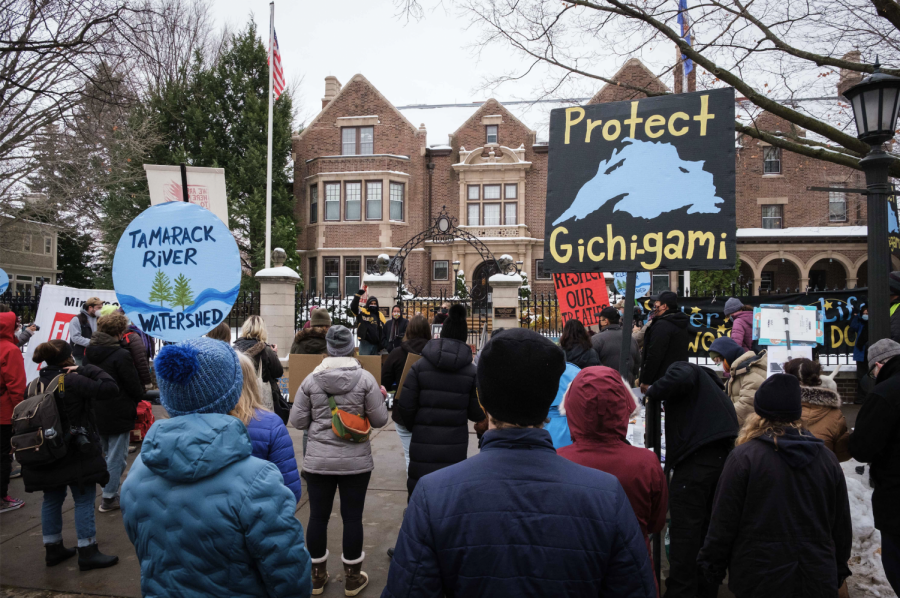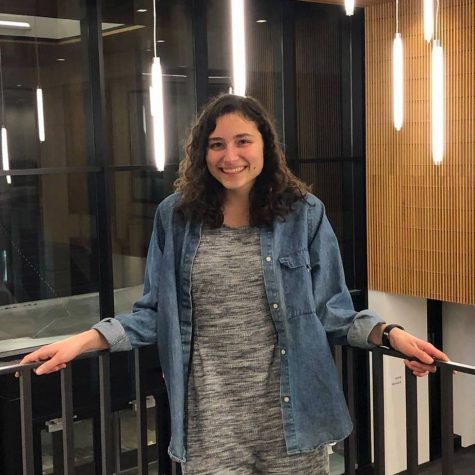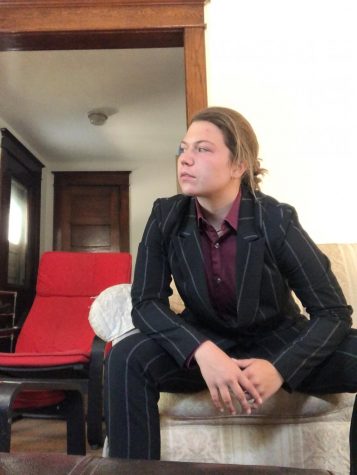Direct action and divestment: Mac’s investment in Enbridge sparks frustration
Hundreds gather outside the Minnesota governor’s residence to protest the Minnesota Pollution Control Agency’s approval of water crossing permits for the Line 3 project. Photo by Kori Suzuki ’21.
February 11, 2021
For the past six years, Macalester has been invested in Enbridge, the company currently constructing the Line 3 pipeline through Indigenous land in violation of treaty rights in northern Minnesota.
Former leaders of the student divestment organization Fossil Free Mac found this information while researching Macalester’s investments in December 2020.
Macalester students, staff and faculty alike have dedicated years to the ongoing movement to stop Line 3. Since Enbridge began construction on the pipeline in November 2020, several students have been arrested for physically blocking construction at the pipeline site in northern Minnesota.
The news of Macalester’s long-standing investment in Enbridge has sparked anger — but not surprise — among Macalester community members protesting the pipeline. While protests escalate on the front lines and in the courts, some students are rekindling the push at Macalester to divest from fossil fuels, and from Enbridge in particular.
Students learn of Mac’s Enbridge investment
Macalester has been invested in Enbridge Energy Partners, a security of Enbridge, since at least fiscal year 2014. The Enbridge Energy Partners investment is a type of publicly-traded partnership.
These investments are listed on a publicly-accessible tax form known as the 990T. Nonprofit organizations like Macalester are required to file a 990T every year listing “unrelated” business income, including gains and losses from privately traded and public limited partnerships, according to Chief Investment Officer Gary Martin.
Students came across Macalester’s most recent 990T in December 2020 while researching the school’s fossil fuel investments. Sasha Lewis-Norelle ’21, a former student leader of Fossil Free Mac and an organizer with the Sunrise Movement, shared this information on Twitter.
Vice President for Administration and Finance David Wheaton confirmed in an email to The Mac Weekly that Macalester is still invested in Enbridge.
Macalester has also held an investment in Energy Transfer Partners, the company behind the Dakota Access Pipeline (DAPL), since fiscal year 2014. Several more fossil fuel companies — like BP Midstream Partners, Sunoco LP and Shell Midstream Partners — round out the most recent list of the school’s investments, too.
In October 2019, after a seven year campaign by Fossil Free Mac, the Board of Trustees agreed to let existing private partnerships in the fossil fuel industry expire. The Board also voted not to start new private partnerships in this industry unless “the Investment Committee believes the investment is reasonably likely to result in a net reduction of greenhouse gas emissions.”
The investment in Enbridge is not a private equity partnership, though, which means that Macalester is under no obligation to limit further investments in it per the October 2019 agreement. The investment also will not “expire” in the way that a private partnership would.
According to Wheaton, Macalester can end the investment in Enbridge at any time. While private equity partnerships generally demand an investment commitment of 10 to 15 years, Macalester can sell its shares in the publicly-traded Enbridge investment at any time.
“Because this is a publicly traded investment strategy, Macalester can exit this strategy by selling the MLP investments.” Wheaton wrote in a statement emailed to The Mac Weekly, which was written collaboratively with Martin and other college staff.
Although selling the investments is possible, the Board of Trustees relegates that specific investment decision to an outside investment management firm — the investment in Enbridge is not managed directly by the Board. 96% of Macalester’s endowment is managed by about 45 different firms.
“The [Board of Trustees] Investment Committee approves the hiring of new managers, and the allocation of additional funds to existing managers,” Martin wrote in the email statement to The Mac Weekly. “Once the managers receive the funds from Macalester, all decisions regarding the purchases and sales of specific securities are made by the managers. Macalester does not direct those decisions.”
Organizations that work with outside investment managers are able to send them guidelines about where they can and can’t invest. Macalester, for example, implemented the Environmental, Social and Governance (ESG) policy in Jan. 2020. This policy weighs the ethical and environmental impacts of any investment. According to Martin, this policy allows Macalester to consider ethical and political issues when selecting and retaining investment managers.
President Suzanne Rivera wrote that decisions on the ethics of investments are more complex than just examining the company itself.
“Often there are competing priorities that seem (or actually are) in conflict with one another and reasonable people can disagree for perfectly valid reasons about which kinds of goodness are most important,” Rivera wrote in an email to The Mac Weekly. “For example, if no longer investing in a certain sector of the economy resulted in fewer Mac students getting financial aid, reasonable people could vigorously disagree about what’s best.”
Fossil fuel investments are not guaranteed to turn a profit for investors anymore. Recently, General Motors announced that it will shift to zero-emission vehicles by 2035. Countries and states around the world including the U.K., Norway and California have announced plans to ban gas-powered vehicles in the next 15 to 20 years.
Fossil fuels projects today, especially pipelines, tend to get tied up in litigation because of environmental concerns, violations of Indigenous treaty rights and protests like those at Standing Rock in 2016 in 2016. President Joe Biden has already revoked the Keystone XL Pipeline permit, and activists and celebrities are calling for a similar decision on both DAPL and Line 3.
CEO of the company Sustainable Business Consulting Kevin Wilhelm ’95 has advised a number of student divestment groups and helps businesses transition their investments away from fossil fuel companies. His expertise is in the business arguments for sustainability and divestment.
“There’s been this myth in the marketplace and in people’s mindset that to invest in [social responsible] businesses and do the right thing that you’re sacrificing financial performance,” Wilhelm said. “Coming off of what’s happening right now in the marketplace — where all the fossil fuel companies are losing money hand over fist — it’s just bad business. It’s just not a smart investment decision.”
Line 3 is no exception to the legal complications of pipeline construction; a court appeal to stop the pipeline on both environmental and Indigenous rights grounds was denied on Feb. 8.
Rivera also explained that, as president, she has very little influence over the college’s investment portfolio and that this particular investment was made prior to her tenure as president.
According to Wheaton, the only body with the ability to change the college’s investment guidelines is the Board of Trustees.
“If a new proposal were to come forward urging additional action, such as re-examining existing holdings for the purpose of determining whether to make changes, the full Board would need to review and is the only entity with the authority to make such a decision,” he wrote.

The divestment movement past and present
While students involved in the fight against Line 3 said they were not surprised by Macalester’s investment in Enbridge, several are considering what a renewed divestment push might look like. Fossil Free Mac officially disbanded at the end of 2019, but the new information has caught some students’ attention.
At the end of last semester, Lewis-Norelle and Emma Harrison ’21, another former Fossil Free Mac leader, met with Rivera to discuss the investment.
“We’re still working on a proposal after meeting with Dr. Rivera,” Lewis-Norelle said. “We want to push for more transparency around our investments. We hope that we can engage with the administration and the Board of Trustees and the community as a whole to push for that and… distance ourselves in our investments from Enbridge and Line 3.”
In his initial tweet about Macalester’s investment in Enbridge, Lewis-Norelle noted that Fossil Free Mac never knew about the investment during their campaign.
“Our campaign and others asked the Board of Trustees and their investment committee about specifics on their investments, including if Mac invests in Line 3 or Enbridge,” Lewis-Norelle wrote. “We were told things like ‘we can’t disclose that’… or ‘we don’t know exactly where the investments are being made.’”
Wheaton said that a certain level of confidentiality exists around certain investment agreements. Specifically, he noted that Macalester cannot share exact dollar amounts invested in various securities.
“Our ability to share specific details about endowment investments is often limited by agreements that require confidentiality of certain information,” Wheaton wrote in the statement. “We have relied on the advice of our external tax preparers regarding the information that we disclose regarding reportable income.”
But those confidentiality agreements still allow Macalester to fill out required tax forms like the 990T, which is publicly available.
For activists and former Fossil Free Mac leaders, information of Macalester’s investment in Enbridge has been a reminder that the Board of Trustees did not vote to divest from fossil fuels in 2019; instead, it voted to adopt its own alternative proposal.
“I think I was maybe a little bit naive in assuming that because people were celebrating after the climax of the Board meeting and the Fossil Free Mac proposal, we were done with having to deal with Macalester and fossil fuels,” Andrew Lee ’23 said. “I’m a little bit older and a little bit wiser and having been at this school for a little bit longer, I’m not super shocked.”
A group of Sustainability Office student workers began researching fossil fuel divestment at the beginning of this semester after learning about the Enbridge investment. They started with research on divestment strategies and outcomes at other similar colleges, and are also taking a closer look at available information about the college’s investments.
The group plans to create a database with information about the companies and securities on the form as well as more specific information on Line 3 and Enbridge.
For some Macalester community members, knowing exactly where the school is invested changes the conversation on divestment.
“I think if Macalester students had known during Standing Rock, or in the aftermath of Standing Rock, that Macalester was invested in Energy Transfer Partners, I think a very different conversation would have been had,” media and cultural studies professor John Kim said. “I think the politics are quite a bit different than not knowing what Macalester is invested in.”

Students, faculty participate in Stop Line 3 movement
The fight against Line 3 is deeply important to several of the students who have dedicated months or years of work to environmental activism. With Enbridge now laying the pipeline in the ground, the work is feeling increasingly urgent to those involved.
“You get there and it smells like death,” Lee said. “It’s really intense and horrifying to watch what Enbridge is doing to the land up there, and also… how protected they are by the government of Minnesota and by the local law enforcement.”
Lee, who has been protesting Line 3 with the Giniw Collective and Honor the Earth this year, was arrested on Jan. 14 in a direct action.
Shortly after the Minnesota government granted Enbridge the permits to start construction in mid-November, protests ramped up in several counties along the pipeline route. Since then, dozens of water protectors have been arrested while blocking construction, including several Macalester students.
Protests have been met with a heavy police presence. Recently, the police department in Beltrami County requested a reimbursement for more than $82,000 worth of riot gear and “less than lethal” weapons, including tear gas, pepper spray, flash-bang devices and batons. The Minnesota Public Utilities Commission maintains an account that allows Enbridge to reimburse the police for expenses related to pipeline construction.
Activists say that arrests, charges and conditions of release have been ramping up in the last few weeks. Arrestees believe that these counties — and Enbridge — are attempting to crack down on protests by imposing harsher conditions of releasing people from jail; Macalester students arrested recently said their terms of release prohibit them from leaving the state or doing any organizing work that would encourage others to join protests.
Betsy Foy ’22 was arrested once in November and again last month, just days after wrapping up her first two-month-long court process. She went into the first protest knowing she might be arrested; the second time, though, she said the police misidentified her as someone else during a protest that she hadn’t expected to be arrested in.
Having been arrested twice, Foy sees a difference in how she was treated the first time and the second time. Last month, both her charges and her conditions of release were higher. Her bail fines were also initially set higher, too.
“They certainly want to quell water protectors, they want to scare them,” Foy said. “They aren’t showing a lot of leniency.”
Foy is nervous for her court process the second time around. After seeing the higher bail fines, charges and conditions of release, she wonders if this process might be longer or more expensive than her first case.
Arrests and court processes can come at a high cost. Rivera clarified in her email to The Mac Weekly that Macalester’s offer to reimburse legal fines for students arrested while protesting extends to students arrested in protests against Line 3.
“Current students who protest peacefully and do not have the means to pay bail or fines can request assistance,” Rivera wrote in her email to The Mac Weekly. “I did not place a geographic limit on that offer.”
Activists say this cause is worth the strain of legal fees. Student activism has played a major role in opposing Line 3, in addition to the long-standing Indigenous activist groups. The Sunrise Movement and MN350 both have strong student cohorts, including many Mac students.
Julia Fritz-Endres* ’19 has been working with MN350 since 2018, first as an intern and now as a volunteer supporting direct action on the front lines. She called her work “a source of life” — a way to combat the anxiety around climate change that she grew familiar with in her time as a student at Macalester.
“I think that a lot of the folks who are showing up on the front lines right now are students because… there are mounting existential threats at all corners of the world,” Fritz-Endres said. “With Macalester students, the community piece is helpful… That’s a really helpful way to get involved in work is if you can see it embodied by someone you share something with.”
Faculty, too, have been involved in Line 3 resistance since the pipeline was announced in 2014. Kim has been working on art, research and activism centered around the Mississippi River for years. He helped set up the space in Palisade, Minn. which is now one of a number of camps where water protectors and activists gather.
Other faculty members, including physics professor Jim Doyle and Director of Sustainability Christie Manning, are active in the fight against Line 3.
“[Line 3] is an abject failure of the environmental regulatory process in this state, especially with regard to climate change,” Doyle wrote in an email to The Mac Weekly. “But the dismissal of Anishinaabe treaty concerns is just as egregious, as is the lack of concern for the consequences of a spill.”
Manning echoed Doyle’s observations on the flaws in the permit process, and on the violation of treaty rights, in an email to The Mac Weekly.
“The injustice of it catapulted me into activism against the pipeline,” Manning wrote.
Members of the Macalester community on the front lines in the fight against Line 3 see a rift between Macalester’s purported dedication to multiculturalism and service to society and its continued investment in Enbridge.
“I think to the extent that… one of the values rather that we hold dear at Macalester is social justice, racial justice, I think [Line 3] is an incredible issue of importance,” Kim said. “That Macalester is part of an investment in Enbridge is a total contradiction to those values.”
*Julia Fritz-Endres is a former editor-in-chief of The Mac Weekly.
Correction: this article previously incorrectly noted that President Rivera had offered to pay legal fees for students arrested for protesting. In fact, as the article reads now, she offered to reimburse fines for students who need assistance paying bail or fines incurred while protesting/















